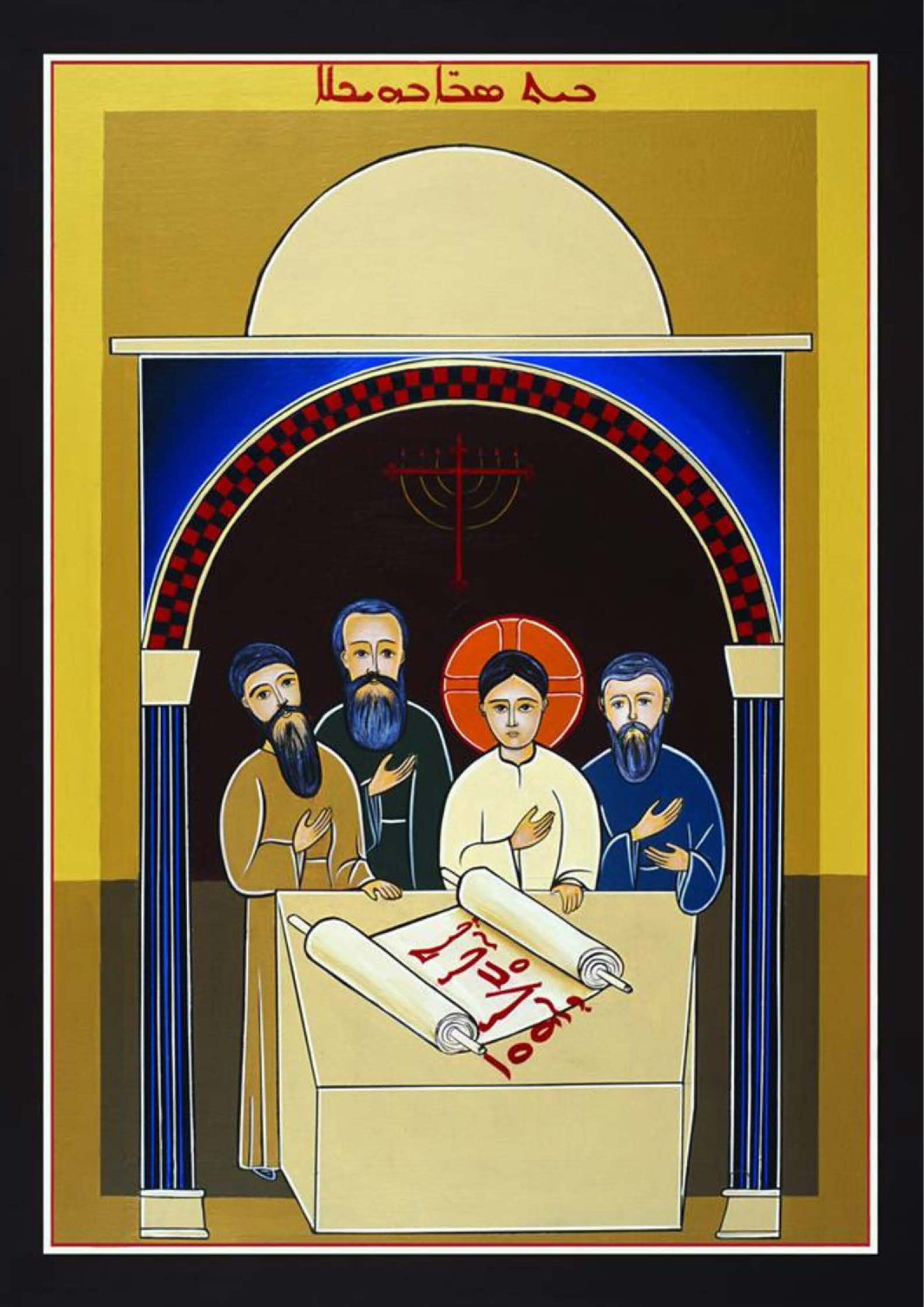
Author: Fr Yuhanna Azize
In the Maronite icon of this feast “written” by the late Fr Abdo Badwi, Jesus is depicted as a child, seated centrally among the elders in the Temple. On the scroll before him, is the Syriac: “It is right for me to be in my father’s house.”
Jesus is the centre. Above him is the seven-branch Menorah which represents the light of God (the central flame), and the fires of holiness and knowledge in the world (the six branches).
Further, it alludes to the Lord among the seven golden lampstands which represent the church (the Apocalypse 1:12).
In this icon, the Menorah is refigured to become a Cross of light. The tradition of Old Testament times is taken up and perfected in the person of he who died on the Cross.
In this icon, the cupola stands for the celestial vault, but in this scene it is also the Temple.
Jesus is in his Father’s house, occupied with his Father’s business, elucidating the Word of God, and unfolding its endless mysteries.
The House of God is a “temple.” That word means “a place set apart.”
Set apart for what? For the worship of God. Surely God can be worshipped anywhere? Yes, but not just “anywhere” is set apart for the worship of God.
The temple is ordered to the worship of God, in the many ways that worship can be conducted, and that one can pray.
It is a haven, a peaceful harbour for reflection, prayer, adoration, and thanksgiving.
The temple, like the church, is a consciously designed space.
The traditional layout of a Maronite church leads us from the door of the world with its baptismal font, and up to the steps to the sanctuary (the threshold of heaven), and the high point: the altar and tabernacle which not just symbolically but in sober truth are the throne and house of God.
With its sacred furnishings and art, all centred on the All Holy, the church reminds us exclusively of the things of God.
With its peaceful interior, the church inclines us to see what is going on in our souls, to make the inside as serene as the surroundings, and to relate all to God.
In traditional churches, the light is different from worldly light: it is subdued, but the glow of the tabernacle lamp (the Real Presence) always shines.
Sound is subdued and hushed, as if breathless before the Lord. The air is made visible and fragrant by incense.
This raises the question: am I often enough in my father’s house? Even if I cannot make it to the church, yet I am in his sight, for he sees all which is beneath and above the celestial vault.
My life can be ordered to God and his holiness. From the church I can learn the lesson of designing my surroundings for that holiness which is proper in my station of life.
I can take simple steps to plan my life: to pray each morning, noon, and evening; to punctuate the day with the rosary and the angelus.
To make a plan for the day each morning, and to examine my conscience each evening. I hallow each meal by grace before and after meals.
I plan my week so that I do not miss the Divine Liturgy on Sunday and holy days.
I follow the church calendar, and make a decision to attend the Divine Liturgy on feast days which mean something to me. I study the Bible, and I read the lives of saints.
It is good to be flexible, but not self-indulgent. When obligations clash, there is rarely an easy answer, but there is a simple rule of thumb: am I giving way to self-love or am I sacrificing what I would like to do in order to perform my duty?
If I do not seize the initiative and make a strategy for the day, I will be at the mercy of all the momentum and chance events of life.
Now, my life in the external world cannot be quite the same as life in the temple. In the world, we have to swim among the currents life.
We have obligations to fulfil, to our families, to our neighbours, and to ourselves, for we must love ourselves rightly (Matthew 22:30).
This is partly the moral of today’s Gospel: Our Lord fitted very well into the temple. He was truly at home there. But he could not remain there always–he had a work to do outside of it.
However, our lives, even our lives in the world take their highest meaning and find their highest purposes fulfilled in the return home to God.
We cannot always be in the temple, and neither should the ordinary person be, but we can order our lives to what is good and holy.
Fr Yuhanna Azize is the Chancellor of the Maronite Eparchy of Australia, New Zealand and Oceania


